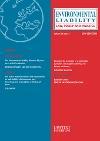Environmental Liability - Law, Policy and Practice - Volume 28 - Issue 5

Volume 28 Issue 5
Feature Article
The Environmental Liability Directive 20 years on: a critical evaluation
KRISTEL DE SMEDT
Maastricht University
BRITT GERRITSEN
Attorney at the Brussels Bar
In 2004, the Environmental Liability Directive (ELD) was adopted. It was a disputed but ambitious attempt to create a European environmental liability regime to ensure the prevention and restoration of environmental damage in the European Union. In 2023, an evaluation of the ELD was carried out by the European Commission. The results of this evaluation are yet to be published. This article aims to critically evaluate, nearly two decades after the adoption of the ELD, its effectiveness regarding the prevention and remedying of environmental damage within the European Union and to anticipate the possible outcome of the 2023 evaluation
Articles
The rule in Rylands v Fletcher and transposition to fault liability: the hazardous user, knowledge and foreseeability in the test of harm
ZIA AKHTAR
The application of the rule in Rylands v Fletcher is based on strict liability of the defendant who brings on to the land any substance that when it escapes is liable to cause damage to the adjoining property. This rule established 150 years ago has been criticised because of its overlap with nuisance and negligence and common law courts have been developing their own jurisprudence towards qualifying the rule. The balance needs to be with the artificial usage of land and the taking of reasonable care and attention to mitigate the damage caused. There needs to be an analysis of the strict liability rules that the English courts have developed with reference to the foreseeability of harm and the test adopted in the US with reference to section 520 of the Second Edition of the Restatement of Torts. This interprets ultra hazardous activity as an abnormal usage of land and the liability arises for all damage flowing from an escape. This comparative article on strict liability in common law jurisdictions measures the extent to which the rule in Rylands and Fletcher has survived, and the element of negligence present which can be attributed to the defendant that makes him liable for the escape to adjoining land from the artificial use where it does irreparable damage to neighbouring property
Financing the transition to a sustainable economy: a race against the clock for Europe and France
CATHERINE MALECKI
Université Rennes 2, France
The EU has drawn up an unprecedented roadmap for sustainable finance in the wake of the Paris Climate Agreements. France has been a pioneer in this field, with its legislators, supervisory and regulatory authorities, dedicated ministries and professional associations being involved in promoting Corporate Social Responsibility (CSR) for over 20 years. Sustainable finance is spearheading the development of CSR, because tackling the ecological transition requires the marshalling of public and, above all, private capital. France’s timorousness vis-à-vis the EU’s climate leadership is often challenged, given the intensity of the work carried out by the European Commission, the European Parliament and the Council since the creation of the High Level Expert Group (HLEG) – 20 per cent of whose members were French – in March 2018, in the fields of green taxonomy, information in the financial and banking sector, and the future EU Green and Social Bonds. In addition, the draft regulation on non-financial rating agencies of 13 June 2023 is a key building block for the regulation of sustainable finance. A European association of extra-financial rating agencies has been created in its wake
Current Survey
European Union
MARTIN HEDEMANN-ROBINSON
University of Kent, Canterbury
Key Policy Developments, January–February 2022
Industry and Environment
Climate Change
Water Resource Management
Nature Protection
Law Enforcement Issues
Water
Waste
Energy
Nature Protection and Biodiversity
Environmental Impact Assessment
Industry
